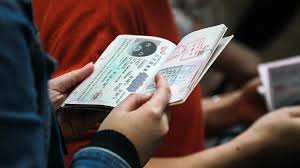Sri Lanka Visa for Greek Citizens: A Comprehensive Guide

Sri Lanka, a stunning island nation in South Asia, is a popular destination for travelers worldwide, including Greek citizens. If you’re planning to visit this exotic paradise, understanding the visa requirements is essential. In this comprehensive guide, we will cover everything you need to know about the “Sri Lanka visa for Greek citizens,” including types of visas, the application process, fees, and more.
1. Types of Sri Lanka Visas for Greek Citizens
Greek citizens planning to visit Sri Lanka have several visa options depending on the purpose of their visit. The most common visa types include:
a) Tourist Visa
The Tourist Visa is the most popular option for Greek citizens traveling to Sri Lanka for leisure, holidays, or visiting friends and family. This visa allows you to stay in Sri Lanka for up to 30 days, with the option to extend it for an additional 60 days.
b) Business Visa
For those traveling to Sri Lanka for business purposes, including attending meetings, conferences, or engaging in short-term business activities, the Business Visa is the appropriate choice. This visa is usually granted for a stay of up to 30 days, with the possibility of extension.
c) Transit Visa
If you’re a Greek citizen passing through Sri Lanka on your way to another destination, you may need a Transit Visa. This visa allows you to stay in the country for a maximum of 48 hours. However, if you do not intend to leave the airport, you may not require a visa at all.
2. Sri Lanka ETA for Greek Citizens
Greek citizens are eligible to apply for the Electronic Travel Authorization (ETA) to visit Sri Lanka. The ETA is an online visa system that simplifies the process of obtaining a visa. It can be obtained before your trip or upon arrival at the airport. Here’s how the ETA works:
a) How to Apply for the Sri Lanka ETA
The application process for the Sri Lanka ETA is straightforward and can be completed online. Here’s a step-by-step guide:
- Visit the Official ETA Website: Greek citizens should visit the official Sri Lanka ETA website to begin their application.
- Fill Out the Application Form: Provide the necessary personal information, including your passport details, travel dates, and purpose of visit.
- Pay the ETA Fee: The ETA fee varies depending on the type of visa and the applicant’s nationality. Payment can be made online using a credit or debit card.
- Receive ETA Approval: Once the application is submitted, Greek citizens will receive their ETA approval via email within a few business days.
- Print the ETA Approval: It is recommended to print a copy of the ETA approval and carry it with you when traveling to Sri Lanka.
b) ETA Validity and Duration of Stay
The Sri Lanka ETA for Greek citizens is valid for 180 days from the date of approval. With this authorization, you can stay in Sri Lanka for up to 30 days, with the option to extend your stay for an additional 60 days at the Department of Immigration and Emigration in Colombo.
3. Sri Lanka Visa on Arrival for Greek Citizens
Greek citizens who prefer not to apply for the ETA before traveling can opt for a Visa on Arrival. This option is available at Sri Lanka’s international airports. However, it is advisable to apply for the ETA in advance to avoid potential delays upon arrival.
4. Visa Application Process for Greek Citizens
The visa application process for Greek citizens is relatively simple, whether you’re applying for the ETA or a traditional visa. Here’s what you need to know:
a) Required Documents
To apply for a Sri Lanka visa, Greek citizens will need the following documents:
- A valid Greek passport with at least six months of validity from the date of entry into Sri Lanka.
- A completed visa application form (if applying for a traditional visa).
- A recent passport-sized photograph.
- Proof of sufficient funds to cover your stay in Sri Lanka.
- A return or onward travel ticket. SRI LANKA VISA HELP DESK CUSTOMER SUPPORT
b) Application Submission
For the ETA, Greek citizens can submit their application online. If applying for a traditional visa, the application can be submitted to the nearest Sri Lankan embassy or consulate.
c) Visa Processing Time
The processing time for the Sri Lanka ETA is usually within 24-72 hours. For traditional visas, the processing time may vary depending on the embassy or consulate, but it typically takes between 3-7 business days.
5. Sri Lanka Visa Fees for Greek Citizens
The visa fees for Greek citizens vary based on the type of visa and the duration of stay. Below is a breakdown of the fees:
- Tourist Visa (ETA): Approximately $35 USD.
- Business Visa (ETA): Approximately $40 USD.
- Transit Visa: Approximately $20 USD.
- Visa on Arrival: An additional fee may apply if you choose this option.
Please note that visa fees are subject to change, so it is advisable to check the latest fees on the official Sri Lanka ETA website or consult with the nearest Sri Lankan embassy.
6. Extending Your Stay in Sri Lanka
Greek citizens who wish to extend their stay in Sri Lanka beyond the initial 30 days allowed by the ETA can apply for a visa extension. Here’s how to do it:
a) Where to Apply
Visa extensions can be applied for at the Department of Immigration and Emigration in Colombo. It is advisable to apply for the extension well before your current visa expires.
b) Required Documents for Extension
To apply for a visa extension, you will need the following documents:
- A completed visa extension application form.
- Your passport with the current visa.
- Proof of sufficient funds for the extended stay.
- Proof of accommodation in Sri Lanka.
c) Extension Fees
The fee for extending your Sri Lanka visa varies depending on the duration of the extension. Generally, the cost is around $20-30 USD for an additional 30 days.
7. Important Tips for Greek Citizens Traveling to Sri Lanka
Before embarking on your journey to Sri Lanka, Greek citizens should keep the following tips in mind:
- Check Passport Validity: Ensure that your passport is valid for at least six months from your date of entry into Sri Lanka.
- Health and Vaccination Requirements: Check if any vaccinations are required before traveling to Sri Lanka. It is also advisable to carry necessary medications and health insurance.
- Respect Local Customs: Sri Lanka is a country with rich cultural traditions. Greek citizens should respect local customs and dress modestly, especially when visiting religious sites.
- Emergency Contacts: Keep a list of emergency contacts, including the nearest Greek embassy or consulate in Sri Lanka, in case of any issues during your stay.
8. Conclusion
Visiting Sri Lanka is an exciting opportunity for Greek citizens to explore a land rich in history, culture, and natural beauty. Understanding the visa requirements, including the “Sri Lanka visa for Greek citizens,” is crucial for a smooth and enjoyable trip. Whether you opt for the ETA, a Visa on Arrival, or a traditional visa, the process is straightforward and designed to make your travel experience as hassle-free as possible. Remember to plan ahead, gather all necessary documents, and follow the guidelines to ensure a memorable visit to Sri Lanka.
